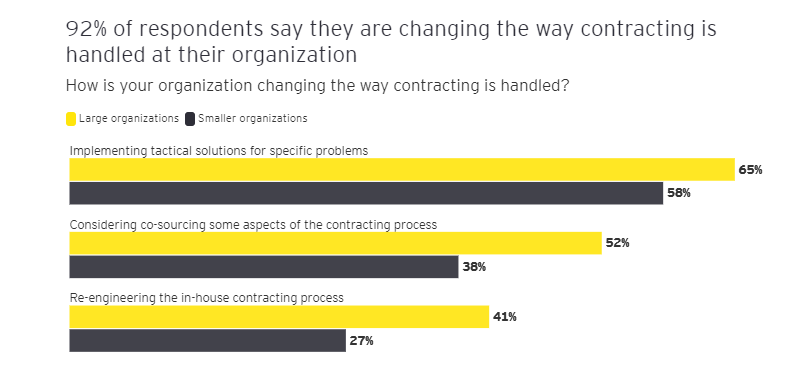How to Effectively Manage Service Contracts within Your Facility

Dealing with service contracts can be an ongoing challenge. Handling multiple vendors, countless renewal dates, and numerous contractual agreements can overwhelm you with paperwork and commitments.
Unfortunately, inadequate contract management practices and non-compliance can have significant financial implications.
According to World Commerce & Contracting, businesses endure an average loss of 9% of their annual revenues due to these issues. Such statistics highlight the importance of implementing effective contract management strategies to mitigate potential losses.
When faced with the repercussions of poor contract management, businesses often find themselves scrambling and wasting valuable time and resources in a frantic search for crucial documents. It’s a situation that no business wants to find itself in.
The combination of financial implications and the hassle of document retrieval underscores the urgency for businesses to adopt streamlined contract management practices.
In this blog post, we’ll explore practical strategies and simple steps to help you effectively manage facility management contracts. We’ll address common challenges, offer valuable insights, and highlight the importance of streamlined contract management. So, let’s dive in and discover how you can take control of your contracts, save time, and maximize profitability.
The Strategic Value of Managing Service Contracts Within Your Facility
The challenges extend beyond misplaced contracts. Poor contract management can have a significant impact on profitability and revenue.
EY research reveals that 92% of organizations are undergoing significant changes in their contracting practices, with 60% implementing comprehensive transformations.

Source: Ernst & Young
Surprisingly, 99% of these organizations lack the necessary data and technology to enhance their contracting process, resulting in a notable disparity between strategic goals and successful execution. Thus, leading to quality issues, pricing discrepancies, and missed opportunities.
To overcome these challenges and optimize service contract management, it’s crucial to adopt certain strategies let us understand them in more detail below.
Lay the Foundation
Let’s kick things off on the right foot and lay the foundation for effective contract management within your facility.
We all know that contracts can be a headache, but taking the time to assess your contract needs and establish clear expectations is worth every minute. It’s like building a solid base for your business to thrive.
When you have clear processes and guidelines, it’s easier for each team member to understand their roles and responsibilities. Plus, the necessary systems make contract management a breeze.
Get a Grip on Your Contract Must-Haves: Spot Your Needs!
It’s time to figure out what really matters to you when it comes to service contracts. Take a moment to reflect on your specific needs and requirements.
- Identifying Essential Services
Think about the core services that keep your facility humming. Is it preventive maintenance, equipment repairs, or specialized installations?Whatever it may be, prioritize the essentials and make sure your contracts have got you covered.
Let’s say you operate a food processing facility. In this case, the core services that matter most might include regular sanitation and cleaning, equipment calibration, and preventive maintenance to ensure food safety and compliance with industry standards. By prioritizing these essential services, you can ensure that your contracts align with the critical requirements of your facility.
- Determine Contract Duration: Short-Term vs. Long-Term Commitments
When it comes to contract duration, you have some decisions to make. Are you looking for short-term or long-term partnerships?Both have their perks.
Short-term contracts offer flexibility and allow you to adapt to changing needs. On the other hand, long-term commitments provide stability and potential cost savings.
Consider a pharmaceutical manufacturing facility. For short-term commitments, you might opt for contract agreements with specialized laboratory testing services to validate product quality during the research and development phase.
On the other hand, for long-term commitments, you may seek partnerships with suppliers of raw materials to secure stable pricing and ensure a continuous supply chain for your manufacturing operations.
Choose wisely based on your facility’s goals and what feels right for you.
- Analyze Budgetary Considerations:
Take a close look at your financial situation and determine what you can afford.Consider upfront costs, ongoing expenses, and payment terms. Remember, you want to keep the cash flowing without breaking the bank.
It’s all about finding that sweet spot where your contracts align with your budget and keep your financial health intact.
- Leverage Facility Maintenance Software to Maximize Efficiency and Accuracy
Say goodbye to tedious paperwork and embrace digital transformation for improved contract management.“While it’s not generally advisable for organizations to leverage each and every new technology release, it’s important to understand the gaps in your contract technology stack and how new technology, when deployed properly, can improve contracting operations with increased efficiency and transparency”, says Alex Fortescue-Webb, EY Global Law Contracts Co-Lead.
Technological solutions like facility maintenance software streamlines contract creation, storage, and tracking, ensuring timely renewals and easy access to critical information.
With automated reminders and notifications, you can stay on top of contract deadlines and obligations. By centralizing contract data and reducing manual tasks, these software solutions enable you to allocate resources effectively, minimize errors, and optimize your contract management process.
Clear Expectations Are Key
By setting the stage right from the beginning, we can avoid headaches, deliver exceptional service, and ensure smooth operations. So, let’s dive into three powerful strategies that will revolutionize your contract management game.
- Set the Bar High, No Compromises:
Defining performance standards is like plotting the course to success. It means setting the bar high and making no compromises on the quality of services provided.Whether you’re running a restaurant, a construction site, or a healthcare facility, these standards become your North Star.
Think response times, cleanliness levels, customer satisfaction ratings, and regulatory compliance. By aiming for excellence, you’ll build a reputation that’ll make your competitors green with envy.
- Outline Service Level Agreements (SLAs): Let’s Get Specific:
Think of SLAs as your secret handshake with your clients. These magical documents spell out the specific services to be provided, the quality expectations, and the timelines for delivery.They ensure everyone’s on the same page, from routine maintenance schedules to emergency response times. By getting specific and crystal-clear, you’ll avoid any miscommunications and keep your clients singing your praises.
- Establish Metrics that Matter:
Key Performance Indicators (KPIs) play a vital role in measuring the success and effectiveness of service contracts within your facility. These metrics help you track performance, identify areas for improvement, and make data-driven decisions.Selecting the right KPIs is crucial, as they should align with your facility’s objectives and provide meaningful insights.
For instance, in a hospitality facility, KPIs may include guest satisfaction ratings, average response time for guest requests, room occupancy rates, and revenue per available room. By monitoring these KPIs regularly, you can identify trends, address issues proactively, and drive continuous improvement.
Seal the Deal
As a facility contractor, when it comes to managing service contracts, it’s all about sealing the deal in a way that leaves both parties feeling satisfied and ready to embark on a successful journey together.
Below we’ll dive into strategies for how we can seal the deal for effective service contract management.
Negotiating Favorable Terms
It’s all about finding that sweet spot where both parties are dancing to the same beat. We’re talking about discussing factors that matter, such as response times, equipment specifications, and the scope of services.
By doing so, you’ll ensure that the service contract fits your facility’s unique needs like a well-worn glove. Below are the 3 strategies to make it happen.
- Embrace Flexible Payment Options:
When it comes to managing service contracts, flexibility in payment options can be a game-changer. By offering diverse payment methods, such as monthly installments or customized payment plans, you can alleviate financial burdens and make it easier for both parties to fulfill their obligations.For instance, a manufacturing facility may collaborate with its clients to create a payment structure that aligns with its budgetary constraints, enabling a smoother contract management process.
- Utilize Penalties and Incentives:
Penalties and incentives are powerful tools to drive compliance and accountability in service contracts. Consider a facility management company that contracts security services.They implement a penalty system for instances of inadequate staffing or service disruptions while offering incentives for exceptional performance.
This motivates the security service provider to maintain high standards, ensuring a safe and secure environment for facility occupants.
- Guarantee Exceptional Service:
Here’s the deal: you gotta promise the moon, and then deliver it! Service guarantees are a way to instill confidence in your facility maintenance contract.By promising exceptional service levels and delivering on those promises, you can build trust and loyalty with your service providers.
For instance, a hospital facility may include a service guarantee in its contract with a medical waste management company, ensuring compliance with regulations and safe disposal practices. This not only protects the facility but also enhances its reputation within the community.
Ensuring Legal Compliance
When it comes to managing service contracts in facility, staying on the right side of the law is crucial.
Neglecting legal compliance can lead to headaches and hefty fines that none of us want to deal with. Below we’ll dive into the importance of understanding regulatory requirements, conducting thorough legal reviews, and securing the right insurance coverage.
- Safety First, Always: Prioritize Compliance for a Secure Facility
From building codes to safety standards, understanding and complying with regulatory requirements is essential.By staying informed about the regulations relevant to your facility, you can ensure that your service contracts align with legal obligations, protect the well-being of occupants, and maintain a safe environment.
Real Talk: Regulations may seem like a hassle, but they are in place to safeguard lives and property. Embrace compliance as an opportunity to create a secure and compliant facility that fosters trust among stakeholders.
- Legal Review of Contracts: Dotting the I’s and Crossing the T’s
Before you sign on the dotted line, it’s time for some serious “I” dotting and “T” crossing. We’re talking about the legal review.Contracts are the backbone of service agreements, and ensuring they are legally sound is crucial. Engaging legal professionals to review contracts helps identify potential risks, clarify terms and conditions, and protect your facility’s interests.
A thorough legal review ensures that your contracts are robust, minimize uncertainties, and provide a solid foundation for a successful working relationship.
- Address Insurance and Liability in Service Contracts
When it comes to managing service contracts, addressing insurance and liability coverage is essential.Ensuring that your service providers have adequate insurance coverage, such as general liability and workers’ compensation, safeguards your facility from financial risks and liabilities arising from accidents or damages. It gives you peace of mind, knowing that your facility is protected.
Level Up Your Contract Management Skills
We know the daily hustle of managing service contracts within your facility can be quite an adventure. From juggling vendor agreements to maintenance contracts, it’s a never-ending maze of paperwork.
But fear not, because we’re going to understand how to manage service contracts in facility and uncover some powerful strategies.
Organize Contracts Effectively:
By going digital and organizing your contracts in a neat and tidy system, you’ll have all your ducks in a row and you can bid farewell to the paper chase.
Think about how much easier it’ll be to locate that supplier contract for your restaurant’s fresh produce or track maintenance services for your hotel.
According to industry stats, businesses that digitize their contracts experience a whopping 65% reduction in contract cycle times. That’s more time for you to focus on what really matters!
- Centralize Contract Repository: Embrace the Digital Revolution
By storing all your contracts in a secure digital hub, you can access them anytime, anywhere. Just imagine the convenience of having all your facility’s maintenance contracts at your fingertips, ready to tackle any repair emergency. You can do it in the following way:-Choose a reliable facility maintenance management software or platform that allows for centralized storage and access.
-Ensure the platform offers robust security measures to protect sensitive contract information.
-Set up user permissions and access controls to ensure authorized personnel can view and edit contracts.
- Establish Contract Version Control:
By implementing a robust version control system, we can ensure that everyone is on the same page. Whether it’s updated equipment maintenance contracts in your manufacturing facility or amendments to service agreements, you’ll have full visibility of the latest version. No more confusion, no more oops moments.Simply start with establishing a clear version control system, such as using a version numbering or date stamping mechanism. Clearly communicate the version control process to all relevant stakeholders involved in contract revisions. And then maintain an audit trail of contract changes, including details of who made the revisions and when.
- Accessibility and Retrieval: Find It, Use It, Ace It
Implement a user-friendly interface for easy navigation and search within the contract management system. Assign appropriate metadata or tags to each contract, including relevant keywords, dates, and parties involved. And they enable advanced search functionalities, allowing users to search for contracts based on specific criteria.By setting up an organized contract management system, you’ll have quick and easy access to contracts whenever you need them. Whether it’s lease agreements for your retail store or supplier contracts for your plumbing services, you’ll have all the information at your fingertips.
Communication is Key
Whether you run a restaurant, hotel, or any other facility, establishing clear lines of communication can make all the difference in ensuring smooth operations and maximizing the value of your service contracts.
Below we will explore the practical strategies for enhancing your contract management communication skills.
- Streamline Communication Channels
Facilities like restaurants and hotels often have multiple departments working together. To streamline contract management, it’s crucial to break down silos and foster collaboration.Implementing a centralized communication platform or software can help facilitate seamless communication between departments, contractors, and suppliers.
For instance, a hotel can use project management tools to coordinate with different teams, such as the front desk, housekeeping, and maintenance, ensuring that service contracts are effectively managed and executed.
- Keep Everyone in the Loop:
Keeping everyone involved and informed is essential for effective contract management. In a restaurant, regular updates on food supplier contracts, equipment maintenance schedules, and pest control agreements help the management team make informed decisions and address any potential issues proactively.Hotels can benefit from routine reporting on service contract performance, ensuring that all parties are meeting their obligations. By maintaining transparency and sharing progress reports, you can identify areas for improvement and optimize contract management processes.
- Streamline Issue Resolution:
In any facility, issues or disputes may arise during the course of service contracts. Prompt and efficient issue resolution is crucial to maintain smooth operations. For example, if a restaurant faces a quality issue with a food supplier, clear protocols and open communication channels can help resolve the problem quickly and amicably.Hotels may encounter challenges with contract deliverables from service providers, such as delayed room cleaning or maintenance. By establishing effective issue-resolution procedures, you can address problems promptly, minimize disruptions, and ensure contract compliance.
Conclusion
Managing service contracts in facility is no easy task, but it’s a vital one. Understanding the importance of effective contract management can save you from costly mistakes and ensure smooth operations.
Remember, it’s not just about signing a piece of paper; it’s about knowing the difference between a good contract and a great one. Successful vendor negotiation plays a crucial role in this process. Take a proactive approach by thoroughly reviewing terms, negotiating favorable conditions, and keeping open lines of communication with your service providers—all while utilizing the features and benefits of facility management software.
By leveraging FieldCircle and its advanced tools and functionalities, you’ll be well-equipped to navigate the complexities of service contracts, streamline processes, and create mutually beneficial partnerships.
By doing so, you’ll be well-equipped to navigate the complexities of service contracts and create mutually beneficial partnerships.


